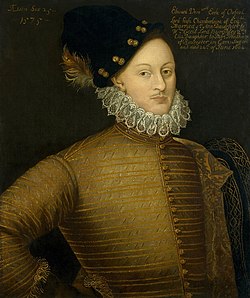Truth be told, I'm a Shakespeare Authorship Agnostic.
Until a few years ago, I hadn't realized how little and shaky the evidence was that W. Shaksper, the guy from Stratford-on-Avon, wrote the plays and poems attributed to William Shakespeare. I saw a PBS special on Edward de Vere, the Earl of Oxford, and the authorship question in general and was hooked. It's fascinating. If Shaksper did not write the ouevre, Oxford's claim is backed by good evidence, and Oxford's life imbues the plays and sonnets with heart-breaking biographical subtext.
I could blather and bowdlerize for days on the authorship question and may at some point in the future, but for the sake of this post and it's conclusions, I'd like to gloss over it and just specify the following, if de Vere wrote the Shakespearean plays and the sonnets, then:
- It seems from Oxford's own letters, signature, the sonnets, and the plays that in his youth and like so many others, Oxford had lofty aspirations to marry Queen Elizabeth I and become the King Consort.
- Henry Wriothesley, the 3rd Earl of Southampton (the generally acknowledged Fair Youth of the sonnets,) was Oxford's illegitimate son.
- Southampton's mother may well have been Queen Elizabeth I, who may be The Dark Lady of the sonnets. (Changes everything you thought about the sonnets, doesn't it?)
- While Oxford perhaps did not want to sully his good name by associating it with playwriting or the possibly treasonous poems ("My name be buried where my body is, And live no more to shame nor me nor you. For I am shamed by that which I bring forth, And so should you, to love things nothing worth.") he was obsessively interested in his noble and royal legacies.
- Oxford wanted his own offspring on the throne or, barring that, at least to inherit his own earldom. Oxford's oldest daughter and the heir for many years may have been conceived while he was in Italy, thus illegitimate and not his biological offspring, and so he tried to marry his biological but illegitimate son (Southampton) to his legal but not biological daughter so that his earldom would at least pass to his biological grandchildren. The purposed marriage is historical fact about Oxford and surely seems to be supported by the sonnets.
On FB, some people were lamenting a lack of Oxford's documents and where they might be hiding, and I got to thinking, what if Oxford gave them to Southampton, his historically documented very good friend and possible son? Who would have those papers now?
So I went looking for Southampton's descendants. (Full disclosure: I looked on Wikipedia. This isn't an academic dissertation. This is 30 minutes of idle time while The Kid was doing subtraction.)
Some background: I just finished publishing a book with a main character who is a modern-day European prince and, because I'm a little OCD, I traced my character's ancestors back 1000 years and mapped his relationship to most of the royal houses of Europe, including England's.
Imagine my surprise when, while researching the descendants of Henry Wriothesley, the 3rd Earl of Southampton, some familiar names started popping up.
Henry Wriothesley, the 3rd Earl of Southampton (Oct 1573 - Nov 1624) m. Elizabeth Vernon
Thomas Wriothesley, the 4th Earl of Southampton (Mar 1607 - May 1667) m. Rachel de Massue
Lady Rachel Wriothesley (c. 1636 - Sept 1723, a published author) m. William Russell, Lord Russell
Wriothesley Russell, 2nd Duke of Bedford (Nov 1680 - May 1711) m. Elizabeth, daughter of John Howland of Streatham
John Russell, 4th Duke of Bedford (Sept 1710 - Jan 1771) m. Lady Diana Spencer (no, not that Lady Di, we're in the early 1700's. This one was the daughter of Charles Spencer, 3rd Earl of Sunderland)
Francis Russell, Marquess of Tavistock (September 1739 – March 1767) m. Lady Elizabeth (daughter of William van Keppel, 2nd Earl of Albemarle)
John Russell, 6th Duke of Bedford (July 1766 – October 1839) m. Lady Georgiana (daughter of Alexander Gordon, 4th Duke of Gordon)
Lady Louise Jane Russell (Jul 1812 - March 1905) m. James Hamilton, the 1st Duke of Abercorn
James Hamilton, the 2nd Duke of Abercorn (August 1838 – January 1913) m. Lady Maria Anna Curzon-Howe (1848–1929), daughter of Richard Curzon-Howe, 1st Earl Howe
James Albert Edward Hamilton, 3rd Duke of Abercorn, (30 November 1869 – 12 September 1953) m. Lady Rosalind Cecilia Caroline Bingham (1869–1958), daughter of Charles George Bingham, the 4th Earl of Lucan
Lady Cynthia Elinor Beatrix Hamilton (16 August 1897 – 4 December 1972) m. Albert Edward John Spencer, 7th Earl Spencer
Edward John "Johnnie" Spencer, 8th Earl Spencer, (24 January 1924 – 29 March 1992) m. Lady Frances Ruth Roche, daughter of Edmund Maurice Burke Roche, the 4th Baron Fermoy
Lady Diana Frances Spencer (Yeah, there she is. 1 July 1961 – 31 August 1997) m. Charles, Prince of Wales
-Prince William, Duke of Cambridge (William Arthur Philip Louis, born 21 June 1982) married Catherine Middleton
-- Prince George of Cambridge, born on 22 July 2013
-Prince Henry "Harry" of Wales (Henry Charles Albert David, born 15 September 1984
So, if all stipulated is correct, if none of the preceding were born on the wrong side of the sheets, and if all goes well, Edward de Vere, the Earl of Oxford has three upcoming chances for his progeny to take the throne.
I hope Edward is smiling, somewhere.







